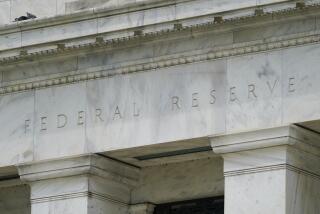Ronald McKinnon dies at 79; economist opposed Fed asset purchases
- Share via
Ronald McKinnon, a retired professor of economics at Stanford University who warned Federal Reserve policy makers including former Chairman Ben Bernanke that its large-scale asset purchases would harm the economy, has died. He was 79.
He died Wednesday at Mills-Peninsula Medical Center in Burlingame, Calif., according to Clifton Parker, a Stanford University spokesman. The cause was head trauma, including a series of strokes, following a fall on an escalator at San Francisco International Airport on Sept. 18.
McKinnon specialized in international trade and finance, economic development and monetary theory and policy during his five decades at Stanford. The author of numerous academic papers, he also wrote eight books, including “The Unloved Dollar Standard: From Bretton Woods to the Rise of China” (2013). In addition, he worked as a consultant to central banks, the World Bank and the International Monetary Fund.
“He was both an intellectual powerhouse and a fun-loving colleague with a twinkle in his eye while he told a joke or two or argued for his favorite unconventional theory,” Stanford economist John Shoven said in an e-mailed statement to colleagues.
In the early 1970s, McKinnon helped introduce the concept of financial repression, the idea that government intervention in credit markets impedes economic growth.
In 2010 McKinnon was one of 23 economists and investors who wrote an open letter to Bernanke, then the Fed’s chairman, calling for him to end the central bank’s quantitative easing program of buying bonds to keep interest rates low.
“We disagree with the view that inflation needs to be pushed higher, and worry that another round of asset purchases, with interest rates still near zero over a year into the recovery, will distort financial markets and greatly complicate future Fed efforts to normalize monetary policy,” the letter said.
Signers included Michael Boskin, a Stanford economist and former chairman of President George H.W. Bush’s Council of Economic Advisers; James Grant, publisher of Grant’s Interest Rate Observer; and James Chanos, founder of Kynikos Associates LP, a New York-based hedge fund.
In addition to his scholarly work, McKinnon wrote opinion pieces for the Wall Street Journal, the Financial Times and other financial publications. He was critical of U.S. government pressure on China to speed up the appreciation of its currency to end trade imbalances between the two countries.
“Focusing on the yuan-dollar rate is a serious distraction, and it’s time for the U.S. to back off from bashing China over problems that are born mostly at home,” he wrote in a 2010 Bloomberg News column.
Ronald Ian McKinnon was born on July 10, 1935, in Edmonton, the capital of the Canadian province of Alberta. He was the son of Ian Nicholson and Lois Harrison McKinnon, according to Marquis Who’s Who. Four years after receiving a bachelor’s degree from the University of Alberta in 1956, he earned a doctorate in economics from the University of Minnesota. During the summers he served in the Royal Canadian Air Force, according to his resume.
He joined Stanford in 1961 as an assistant professor of economics and received tenure five years later. In 2005 he was named professor emeritus.
In 1957 he married Margaret McQueen Learmonth. The couple had three children: Neil, Mary and David.
“The McKinnon family collectively is above the break-even fertility rate of 2.1 and doing its best to help save Social Security,” McKinnon wrote in his online biography.
Miller writes for Bloomberg News.
More to Read
Start your day right
Sign up for Essential California for the L.A. Times biggest news, features and recommendations in your inbox six days a week.
You may occasionally receive promotional content from the Los Angeles Times.







